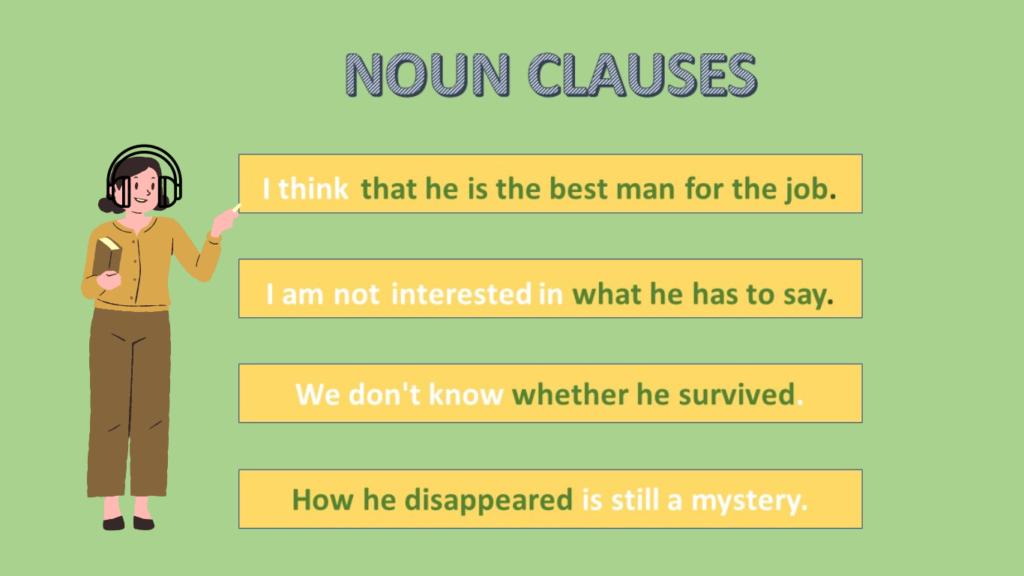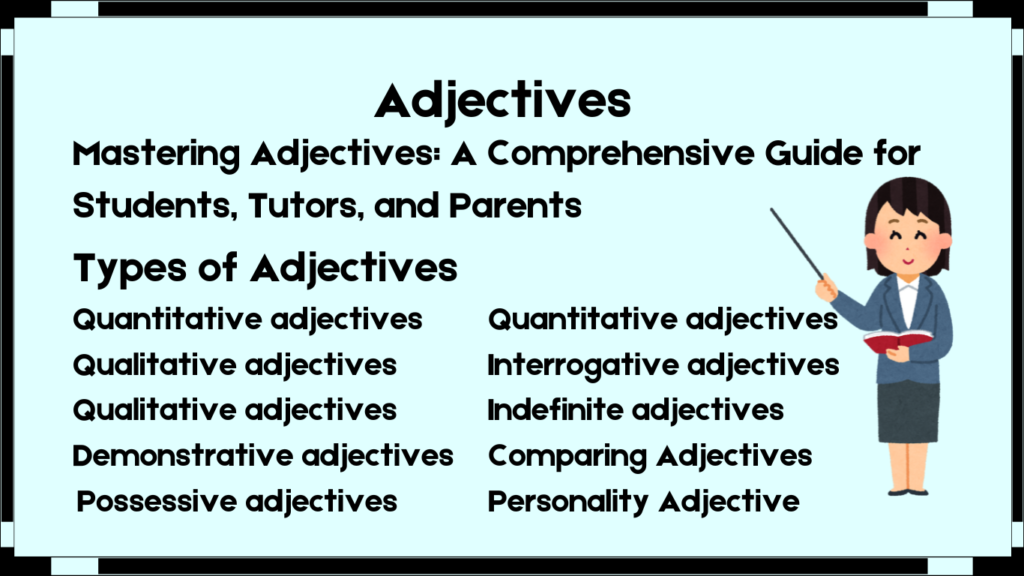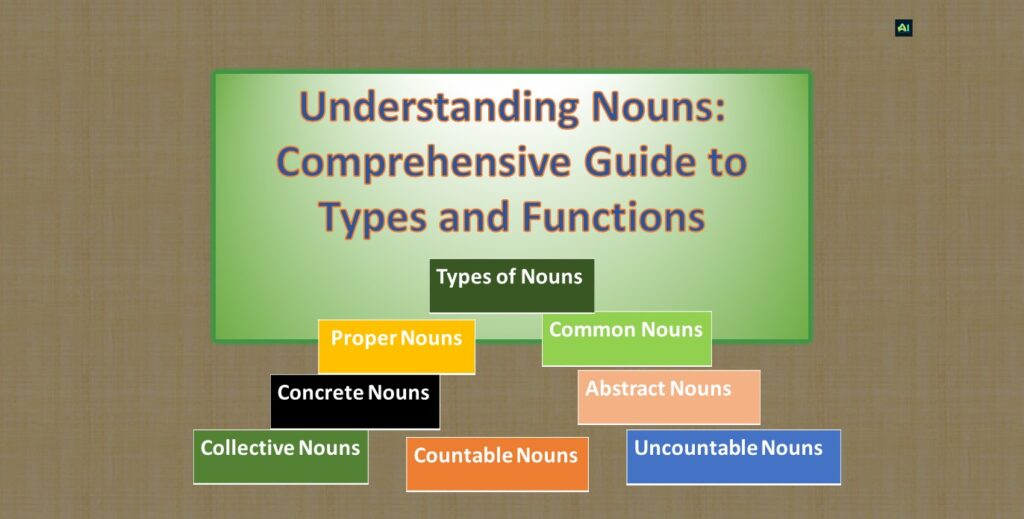Mastering Noun Clauses and Their Functions
Understanding noun clauses is crucial for mastering the Englsh language. Among the varous types of subordinate clauses, noun clauses play a significant role. They act as nouns within sentences, serving as subjects, objects, or complements. For students preparing for exams like WAEC, NECO, and GCE, a solid grasp of noun clauses can make a significant difference in their performance. This blog aims to eamine the intricacies of noun clauses, and provide clear explanations and examples to enhance your grasp of this essential grammatical component.
What is a Noun Clause?
A noun clause is a subordinate clause that does the work of a noun within a sentence. It can serve as a subject, object, or complement, providing additional information and complexity to your sentences.
In case you’re not familiar with subordinate clauses, please read the following section:
What Are Subordinate Clauses?
Key Characteristics of Noun Clauses:
– A noun clause begins with a subordinating conjunction: Common subordinators include that, what, whatever, who, whom, whoever, whomever, which, and whichever.
– It contains a subject and a verb**: Like all clauses, noun clauses have their own subject and predicate.
– It acts as a single part of speech: Despite containing multiple words, a noun clause functions as a single noun.
– Asks you **what? **: A noun clause asks the queston **What? **
Examples of Noun Clauses:
– Subject: **What he said** was surprising.
– Object: I don’t know **why she left**.
– Complement: The problem is **that we are late**.
Types of Noun Clauses
1. **That-Clauses**
These noun clauses begin with the subordinating conjunction “that.” They are often used after verbs of perception, reporting, or mental activity.
– Example:
- She believes **that he is innocent**.
- I know **that Mrs. Sunny is a teacher**.
- She informed me **that she was going to visit her family**.
- He agreed **that it was the right thing to do **.
- He did not admit ** that he was wrong **.
2. **Wh-Clauses**
These clauses start with a wh-word (what, who, which, when, where, why, how). They can serve various roles within the sentence.
– Example:
- I wonder **why she did that**.
- He did not tell us **where he found the hidden treasure**.
- I can’t recall ** what father said last night**.
- Can you tell me **why he has refused to disclose his identty**?
- **How he survved the accident** is stll a wonder.
3. **If/Whether Clauses**
These noun clauses begin with “if” or “whether” and typically follow verbs of uncertainty or questioning.
– Example:
- I am not sure **if she will come**.
- We don’t know **whether the chairman will come**.
- May I know **if the Director has arrived**.
- Can you find out **whether she has submitted the report **?
- His does not know **whether she will accept his proposal or not **.
Functions of Noun Clauses
Noun clauses can perform several roles within a sentence, making them highly versatile.
1. Subject of a Sentence
When a noun clause acts as the subject, it precedes the main verb and dictates the action or state of being in the sentence.
– Example:
- **What you decide** is entirely up to you. (“What you decide” is the subject of the verb “is”)
- **How he disappeared** is still a mystery. (**How he disappeared** is the subject of the verb “is”)
- **Where she got the courage to tell her manager the truth** remans a surprise to me. (**Where she got the courage to tell her manager the truth** is the subject of the verb “remans “
2. Object of a Verb
Noun clauses can serve as the direct or indirect object of a verb, receiving the action or benefiting from it.
– Direct Object
Example:
- I know **what you did**. (**what you did** is the direct object of the verb **know**)
- He could not explain **what happened**. (what happened is the direct object of the verb **explan**)
- I understand what he is talking about. (**What he us talking about** is the drect object of **understand**)
– Indirect —–Object
Example:
- Give whoever comes first **a ticket**. (** whoever comes first** is the indrect object of the verb “give” )
- Dad bought Junior who’s celebrating his birthday a toy car (**Junior who’s celebrating his birthday** is the indirect object of the verb “bought”)
- He told **whoever was ready to listen** a story. (**whoever was ready to listen * is the indirect object of “told”)
3. Object of a Preposition
Noun clauses can follow prepositions, functioning as the object of the preposition.
– Example:
- We are concerned about **how you will manage**.(**how you will manage** is the object of the preposton “about”)
- He was not satisfied with what he achieved in life. (**what he achieved in life** is the object of the preposton “wth” .
- There is no sense in what she suggested to me. (**what she suggested to me** is the object of the preposton “in”)
4. Subject Complement
When a noun clause follows a linking verb, it serves as a subject complement, providing more information about the subject.
– Example:
- The fact is **that she never called**.
- My belief is **that hard work brngs success**.
- Love is **what we think of it**.
5. Appositive
Noun clauses can act as appositives, providing additional information about a noun.
– Example:
- The idea **that we should wait** seems reasonable.
- The information **that the minster is dead ** may not be true. (**that the minster is dead ** is in appositon to the noun “the informaton”)
- The news **that he received an award** made me happy. (**that he received an award** is in appositon to the noun “the news”)
Tips for Identifying Noun Clauses
1. Look for Subordinating Conjunctions
Identify the subordinating conjunctions that often introduce noun clauses. Words like “that,” “what,” “who,” and “whether” are good indicators.
2. Check for Completeness
Ensure that the clause contains both a subject and a verb, forming a complete thought even though it relies on the main clause.
3. Test the Clause
Try replacing the noun clause with a pronoun (it, something, someone). If the sentence still makes sense, you likely have a noun clause.
– Example: I believe **what she said**. (I believe **it**.)
– A noun clause answers the question what. If the majn clause poses the queston **what?** and the subordnate clause answers it; then you likely have a noun clause.
– Example: In the sentence I believe **what she said** ( I believe) is the main clause. This poses the question “What do you believe?” The subordinate clause**what she said** answers the question.
Common Errors and How to Avoid Them
1. Misidentifying Clauses
Be careful not to confuse noun clauses with other types of clauses, such as adverbial or adjectival clauses. Remember, noun clauses function as nouns. Types of Subordinate Clauses Essential for ExaPreparation
2. Subject-Verb Agreement
Do not forget to make sure that the verb in the main clause agrees with the subject. Noun clauses, being complex, can sometimes lead to errors in agreement.
– Incorrect: **What they need are** a good plan.
– Correct: **What they need is** a good plan.
3. Punctuation Errors
When using noun clauses as appositives, punctuate correctly to avoid confusion.
– Correct: The idea, **that we should wait**, seems reasonable.
– Incorrect: The idea **that we should wait** seems reasonable.
Conclusion
Mastering noun clauses can significantly enhance your writing and comprehension skills in English. By understanding their functions and characteristics, you can construct more complex and nuanced sentences. Remember to identify the subordinating conjunctions, check for completeness, and ensure proper subject-verb agreement. With practice, you will find that using noun clauses becomes second nature, adding depth and clarity to your communication.
For more grammar tips and language insights, stay tuned to our blog. Happy learning!



